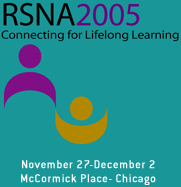
Abstract Archives of the RSNA, 2005
SSC19-08
MRI of Functional Rotator Cuff Tears: Visualizing Burkhart’s Cable
Scientific Papers
Presented on November 28, 2005
Presented as part of SSC19: Musculoskeletal (Shoulder)
Ramesh Devarakonda Rao MD, Presenter: Nothing to Disclose
Derek R. Armfield MD, Abstract Co-Author: Nothing to Disclose
Jeffrey Dalton Towers MD, Abstract Co-Author: Nothing to Disclose
Douglas D. Robertson, Abstract Co-Author: Nothing to Disclose
The concept of functional rotator cuff tears is important. While these tears may be large they do not require repair. Burkhart equated functional tears to a suspension bridge containing a rotator crescent and a firmly anchored cable. We describe the MR features of this important but frequently overlooked pathology.
Our most recent 15 patients with clinically and MR imaging diagnosed functional rotator cuff tears were identified. A musculoskeletal radiologist , who had not previously interpreted the exams, reviewed and recorded the dimensions and location of the cable. Arthroscopic confirmation, at the time of debridement and decompresson, was available in 5 cases.
Prospectively a torn rotator cuff with Burkhart cable was recorded in 7% of all our recent shoulder MR imaging exams. The presence of a cable was always associated with a transverse cuff tear. Tears started at the avascular zone adjacent to the greater tuberosity and extended anteriorly to the superior margin of the subscapularis tendon. Axial and coronal MR images best demonstrated the cable. Cable width averaged 6 mm and mediolateral rotator crescent 15 mm.
Functional rotator cuff tears with their rotator crescent and cable are identifiable on MR imaging exams. Their preoperative diagnosis is critical because individuals with functional rotator cuff tears frequently do not require repair. Most can be adequately treated with debridement and decompression. Thus, it is important for the musculoskeletal radiologist to know the MR imaging features of this cuff pathology.
Rao, R,
Armfield, D,
Towers, J,
Robertson, D,
MRI of Functional Rotator Cuff Tears: Visualizing Burkhart’s Cable. Radiological Society of North America 2005 Scientific Assembly and Annual Meeting, November 27 - December 2, 2005 ,Chicago IL.
http://archive.rsna.org/2005/4417442.html

